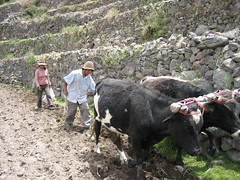
Squealed to a stop to examine a driveway that has turned into a promise... Bulbs: tulips, daffodils. These will come every spring forever.
In ancient times the Incas fed an empire with marginal land utilizing sustainable farming techniques—even managing to store 3-5 years worth of extra food in case drought, hail or frost ruined a year's crops. Today, The Seedling Project is working to record current farming methods as passed down through generations.

 One of the things that first excited me and inspired me to start the seedling project was the idea that history, especially the history of South America, was constantly changing in response to new discoveries about something as hard to preserve as seeds and dirt. According to an article published in Science magazine and quoted in the New York Times, squash was cultivated in the northern Andes 10,000 years ago, which makes South American agriculture nearly as old as that of the Middle East. These kinds of discoveries are slowly changing the way scholars think about the chronology of the civilization of the New World.
One of the things that first excited me and inspired me to start the seedling project was the idea that history, especially the history of South America, was constantly changing in response to new discoveries about something as hard to preserve as seeds and dirt. According to an article published in Science magazine and quoted in the New York Times, squash was cultivated in the northern Andes 10,000 years ago, which makes South American agriculture nearly as old as that of the Middle East. These kinds of discoveries are slowly changing the way scholars think about the chronology of the civilization of the New World.The researchers concluded that these beginnings in plant domestication “served as catalysts for rapid social changes that eventually contributed to the development of intensified agriculture, institutionalized political power and towns in both the Andean highlands and on the coast between 5,000 and 4,000 years ago.”
The evidence at Ñanchoc, Dr. Dillehay’s team wrote, indicated that “agriculture played a more important and earlier role in the development of Andean civilization than previously understood."
http://www.nytimes.com/2007/06/29/science/29squash.html?_r=1&oref=slogin